One of the best ways I know of to explain extraverted feeling is to compare it with extraverted thinking. These two comprise what are known as the extraverted judging functions.
What is Extraverted Judgment?
- Linear/time-oriented. Functions that operate over time and with reference to objectives in external world.
- Seek closure and organization in outer environment.
- Want to get things done. Want results. Feel good when an activity or process is concluded. Do not like open-ended activities.
- Goal-oriented. Want to get from one point to another.
Extraverted Judgment as Auxiliary Function
When extraverted judgment is acting in the auxiliary mode, its primary function is to balance the openness of the dominant introverted perceiving process in order to provide closure in the outer world.
INFJ has extraverted feeling as their form of external judgment. INTJ, the other type that has dominant introverted intuition, has extraverted thinking as their form of external judgment. This presents two opposing methods for achieving a similar goal – formal validation of their interior insights and visions according to some external standard.
The best way to show the difference between these two is if you have a starting point of a and you want to get to b, the two methods of doing this will be opposite to each other.
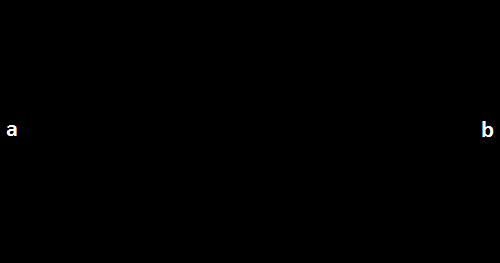
With Te it is simple. Take the straightest and most direct and efficient path.
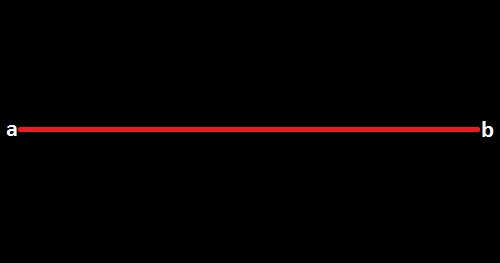
Voila. Done.
Te as an auxiliary function has the gift of choosing the most efficient method to achieve a result or get from one point to another. They ask how they can get to this goal with the minimum waste of time and energy.
Now comes Fe method of getting from a to b.
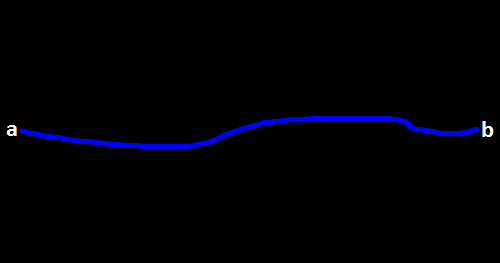
Fe is everything Te isn’t in the same realm. What is the opposite of a straight-line but still linear/time-oriented?
Well, a curved line.
Which means that where Te generally has one correct way to get from point a to b, for Fe there are infinite variations on how to go about getting from one place to another.
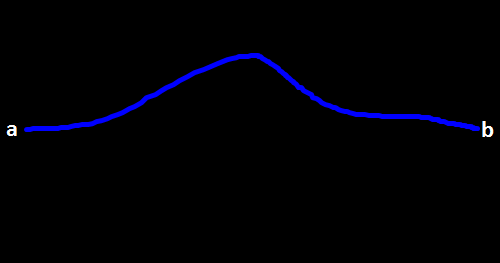
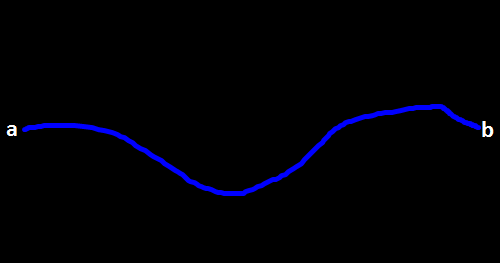
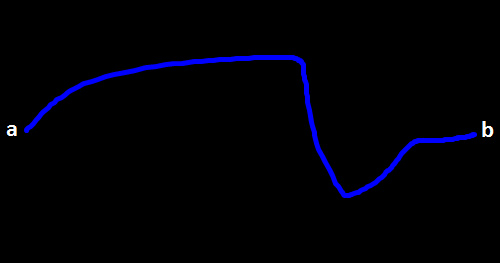
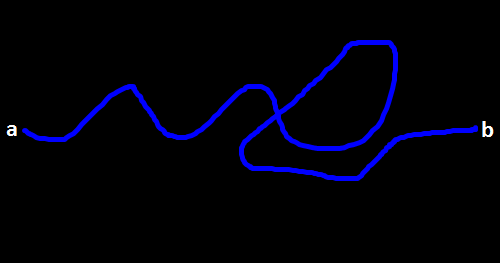
The commonality between both these extraverted judging functions is that they both want to get to a goal they have made a decision to strive towards (Extraverted Perceiving functions, for example, do not have this motivation or method).
INFJ vs. INTJ method
INFJ and INTJ types often function in the same domains, for example, artistic activity is a big crossover domain for these types. Both these types have a sort of symbiotic relationship with each other. Each type is heavily influenced by the other.
However, INTJ is liable to steer INFJ into the wrong method due to many INTJ types writing beautifully as critics and art deconstructionists. They take whole bodies/domains of knowledge and reduce/distill them to down to their essential principles, propositions etc.
What is this excess that they are removing in their process of distillation?
The variations on the basic theme that Fe introduces via the curves in a straight-line.
INTJs tend to take curved lines and straighten them and INFJs tend to take straight lines and curve them. Much of the difference between INFJ proper methods and INTJ proper methods come down to this basic difference. Basically, the one method undoes the other one.
Implications
This has implications for the way that INFJs should organize themselves in the outer world. It is quite a different approach to use Fe as a method in a world that in many ways tries to “correct” and “straighten out” what is essentially a process that is meant to be sort of messy and all over the place, but, nevertheless is driven towards some particular destination, or perhaps more accurately, some port of call.
INFJ cannot do away with Te completely because as it turns out both methods are usually necessary in any endeavor, whether it be artistic production, economic and political organization, or simply ordering one’s own life.
But, since Te operates so inefficiently for INFJs I advise them to minimize its use to absolute basics. There has to be some Te structure there as a basic skeleton or clear demarcation points in time and task, but once those are established, Fe can largely operate within those basic parameters. But, I think there has to be some basic parameters or INFJs can get mighty lost in the process of trying to get to a to b.
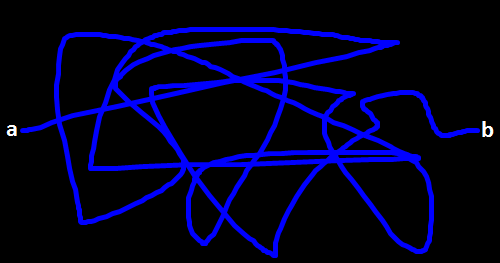
Don’t feel bad. INTJs beat themselves up for not being able to adorn their productions with all the subtlety, nuance, and color of INFJ Fe infinite variations. They tend to get lost in the woods in quite other ways such as not being able to discontinue a line of inquiry and following it to the point of obsession and madness. INFJs have the benefit of getting distracted into all kind of alternate fields and folds aplenty. I guess their danger is in forgetting where they were going in the first place and yet still wanting to get there. Somehow.
It’ll happen with a little help from your friends. That would be me.
Previous Article in INFJ Fe Series:
Next Article in INFJ Fe Series:
INFJ: Curbing Information Addiction
Note: This site depends of contributions from viewers like you. If you appreciate the highly original content you are reading, then consider making a small donation that accords with that value. I aim to keep all information free on Stellar Maze.
Further Note: I offer consulting services via Skype voice to assist INFJs in developing more flow in their life via Fe solutions. If interested, email me at blake@stellarmaze.com and let me know how I can help. I have very reasonable rates.

Beautifully thought-provoking, as usual!
Relates to the Daoist concept that the way of the universe is ordered, but not in over-rationalistically rigidly straight lines:
https://en.wikipedia.org/wiki/Li_(Neo-Confucianism)
Yes, and just wait til I get those I-Ching trigrams involved in this whole business. Gonna be having a time!
Now I understand Fe perfectly. And now I’m certain that the feelings I had in my childhood were manifestations of my Fe. But reading the way Fe and Te work, I sincerely don’t see many advantages in having Fe as a auxiliary function. Maybe in the past, when we had more time and resources, it would be great. But nowadays…
Anyway, I feel bad knowing how Fe works. And now I understand why I wanted to be an INTJ years ago, when I first learned about the MBTI…
I think my personal problem is that, in my self-knowledge journey, I’m currently disappointed with my true self. I want to be something else. And now I need to value my true self and learn to see that happiness will only come when I start to like myself as I am, then I’ll start to invest in myself. (something I think I never did before…)
Totally felt the same way, but reading this blog has made me appreciate my “messiness” more. And I mean, who can you be except yourself?
Wow, THANK you for covering that! Very interesting and insightful. I work with someone who I suspect is INTJ and this explains the dynamic very well, plus it greatly helps in understanding Fe to have something to compare it to. Really great post!
I just discovered this blog and I feel I need to read each post like 10 times to grasp what it is saying. Just when I thought I had discovered everything there was to read about INFJ, BOOM! new material for me to freak out over. I literally just googled “MBTI for dummies” because I think I need the Cliff’s Notes for MBTI in order to understand the lingo in these posts! Every time I get to “Fe” or “Ti” or any of the others in a sentence, I have to pause and think about what it actually means, and I still don’t get it. Ha. My INTJ husband is pretty good at explaining it in layman’s terms for me, though, so I usually just go ask him. But then I tell him I need an example, because I just cannot comprehend these concepts without examples.
So if I have been told more than once in my life: “You know you don’t have to reinvent the wheel…” or “You are making that harder than it has to be…” or “It’s not that difficult, just do it like X, Y, or Z!”…is this an indication that I need to figure out the Fe?? I am slowly, but surely discovering why life seems to be so difficult for me. It has literally been in the last few years of my 39 on this planet that the light bulb has gone off in my head about some things.
There are some very basic, mundane, daily tasks that otherwise normal people seem to be able to complete just fine, but seem monumentally challenging for me and sometimes I feel like I just cannot function in this world. I have this constant contradiction going on in my head between wanting desperately to be “normal,” and the insatiable desire to be utterly and completely different from everyone. I expend an amazing amount of energy regarding these two. Ugh.
You have no idea how long it has taken me to write and simultaneously edit this comment, or maybe you do. Ha. But I am this close to deleting it, because I find that if I start to post a comment anywhere it will inevitably end up the length of a short novel…so I’ll leave it at that. And go read another post *again* and maybe comment, too.
O, I have an idea of how long it might have taken and the contradiction between wanting to be known and express yourself and simultaneously to remain concealed and undeclared. It’s understood. Thanks for commenting.
“There are some very basic, mundane, daily tasks that otherwise normal people seem to be able to complete just fine, but seem monumentally challenging for me and sometimes I feel like I just cannot function in this world”
This is so absolutely true. I mean it’s just such a big irony. I feel like we sometimes just create our own special brand of hell by almost wanting to complicate everything.. My life is in a mess right now because I walked right out of a job and a career that had pretty good prospects and was going to compensate me pretty well.. But I couldn’t get past many of the routine administrative things within my job scope. Not trying to blow my own horn but I had so much feedback that I gave quality work and clients appreciated my work, but I exasperated my superiors to no end because I just couldn’t consistently deliver on all the little things. I constantly think about this and wonder if it it was really because I didn’t like the work and didn’t feel engaged and motivated to deliver, and how simple small things can be so hard for me to get round to.. Although I have no wishes of going back, I sometimes wonder if I’m really just dumb or something..
Great site Blake, you’re the most knowledgable and articulate person I’ve read on the subject of cognitive functions (and that’s coming from a former obsessive-researching enneagram 5).
As an INFJ, I especially find it helpful how you said that it is good to put in Te checkpoints along the way. In planning out my next few months, that’s sort of what I’ve been doing but now that I’m aware of it I am going to be much more effective. Thanks so much!
I was at an airport the other day. A very Te place. People trying to get from A to B. And as an at-times obnoxiously happy, optimistic person it dawned on me that while everyone else is usually trying to get from A to B, I’m pretty much always at B no matter where I am. Do you think that relates to Fe? Or is that a manifestation of some other cognitive function? Finding bliss in the moment, with places to get to but with no worries
Ahahahaha, spider-on-acid mode. Have you been waiting for years for the perfect opportunity to use that analogy?
Of course 🙂
Great great article! However, it just struck me you might only have one side of the coin. I think Fe in regards to logical and life matters is the embodiment of the squigly line when reaching the goal. No doubt. However, in ethical and relational matters it is the exact opposite. When talking with my INTJ friend, I will get so frustrated, because to him, the concept of ‘cheating’ doesn’t really exist as long as you genuinely ‘love’ the person (even if you’re cheating with somebody else.) To me that is the most morally unethical objectively wrong acts. Yet he can’t see it. and I get it. He essentially has no Fe. Morality is only subjective and subject to change when the time calls. The concept of objectively ‘wrong’ actions or words do not really exist. That’s why guys like Simon Cowell (INTJ) and Bill O’reily (ISTJ) can sleep soundly at night, even though half the world is appaled at their manner of critisism. Or why Arnold could have slept with that housekeeper and not told his family about it for 16 years or whatever it was. It’s just a blind spot.
I actually got a little insight into how frustrated my friend must get with me sometimes with my sole subjective logic whilst being completely blind to objective logic.
Great article though! Looking forward to the others 🙂
Where is the like button for this comment? I want to like it a hundred times.
I realize this may be off subject of this post but I’ve been reading about the enneagram for many years. I always identified as a 3. I recently took the enneagram test again and received the exact same score for types 3 and 4. I’m definitely an INFJ but I’m curious if there is anyone else out there that has thought themselves to be a 3 type. I’m definitely introverted but when I use my Fe I can appear quite extroverted. I know that type 4 is considered the norm for INFJ and the older I get the less I’m like a 3 but I can’t say I totally identify with a 4 either. I’m sure I have a very strong wing of 4 with3w or 3 with 4w. Any comments would be appreciated.
Just speaking on my experience, I’m an INFJ and I’ve always identified a lot with 3 as well. What I think might be the reason for my flirtation with the idea of being a 4 and my oscillation between identifying as a dominant 3 and 4 is that in my heart center I’m a 3w4 and in my head center I’m a 5w4. I also can appear and feel very extraverted, maybe that’s just because I’ve done so much enneagram work on myself that I’m becoming more of an observer to my thoughts and ego defense mechanisms than a victim to them.
Seeing that we’re so similar I’m type, if you want to chat more in depth about specific issues you’re having as a result of cognitive functions or enneagram fixations, my email is brettalinehan@gmail.com
How about a post on how Infj’s experience time
It’s time to time time.
Always insightful. This is exactly how I experience time…
And how would an INTJ experience time?
Tick tock tick tock tick tock tick tock tsk tsk tsk…
Actually, no, that’s the ISTJ way of experiencing time.
The Ni doms experience time essentially as eternal. For an INTJ, this would be like throwing eternity onto an assembly line and forcing it to conform to the temporal…
for a time.
I slightly beg to differ. Fe doesn’t necessarily mean less efficient or effective.
Fe might actually match or even trump the Te approach in effectiveness, especially when it comes to messy and complex tasks. (Assuming ceteris paribus, etc, etc) Sort of like how when sorting stuff at home, simply diving in and going with the flow might actually produce greater results than organizing and planning. Call it emergence, wu wei, intuitive flow, etc etc.
Yes, I can see your point.
According to what I’ve read on your site, the cognitive functions of INFJ personality type look (in a very simplified way) like this:
1. Ni – ego
2. Fe – way to be happy in the long run, often blocked by Ti
3. Ti – way to feel happy in the short run, we are prone to overuse it
4. Se – a process that we are aware of, but cannot take part in it
5. Ne – ???
6. Fi – id
7. Te – superego
8. Si – hell
All of the functions apart from Ne were mentioned somewhere on this site, so my question is how does Ne work for INFJs?
Thanks in advance for your reply.
I differ from the author.
Ni/Si is superego (in freudian sense), Ne/Se is id, T and F represent ego.
hence, IxxJs are superego dominant psyches. Moreover, INxJs have suppressed id (Se) which manifests when they are in the grip, they become selfish and aggressive (due to activation of the repressed id, or rather due to momentary collapse of the superego and ego due to external stressors).
Te goes for the shortest and most efficient path but steps on other people’s toes. Fe navigates around others so as not to offend them, hence the longer path.
“There has to be some Te structure there as a basic skeleton or clear demarcation points in time and task, but once those are established, Fe can largely operate within those basic parameters ”
Am sadly a spider on acid, I have been trying to write my research paper for the last 3 months and failing miserably. All motivation and self discipline techniques seems to be lost on me 🙁
What do you think is the best way to bring out the Te in the INFJ ?
I just wrote an article on this and there will be more coming.
“the contradiction between wanting to be known and express yourself and simultaneously to remain concealed and undeclared”
…This is the most difficult thing I have struggled with as an INFJ, for my entire life.
Is there any solution for this?
Yeah, Morning Pages is a great activity for INFJ for just this very reason. You express without any filtering at all and then you don’t show it to anyone.
As you gain in experience of this Expression, you will know better when it is better to express and when it is better to remain silent.
And sometimes if you get really groovy and awesome, you can say something that alternately reveals and conceals you at the same time!
Great artists do this all the time. Hell, it probaly is the key to great art!
Also, Morning Pages (or some form of unedited and free expression) gets you out of the “this is precious and sacred” mindset that many INFJs have.
I’m am fully of the opinion that an INFJ needs to start throwing paint at the wall as a beginning strategy to get them unblocked.
Just let it fucking ride!
Then, later (much later in many cases) you’ll arrive at the place where you began and say it perfectly without an afterthought.
There are too many things to attach to and fret over as a distorted meaning. And any meaning is distorted unless it can be brought into the universalizing context of Fe (for INFJ at least).
Because, for example, an INFJ could say “I’m sad”. But, then they could also think as an afterthought “Yes, but are you really sad?” “In comparison to what or whom?” “What is sadness really?”
An INFJ is looking for that one thing they can say about themselves in an unqualified fashion.
Thing is that is more the end of their search and if they attempt to do that prematurely, they will block and get all analytical and sad about their precious self and the expression thereof.
So, an INFJ really has to learn to take expressive action that gets them out of that endless analysis or who they really truly and authentically are.
The only way they will feel satisfied in that motivation is to open up the floodgates.
Afterall, an INFJ could be anything. Of all the things an INFJ could say about themselves, they could equally say the opposite too. Right?
They could say “You know, I’m a real asshole.” Then, they could go “Yeah, but I’m also a really noble and altruistic person.”
The trick is they are both. And neither. Actually, the trick is to express both and be OK with that dichotomy.
The best artists ALWAYS blend both extremes in their work.
I think there is a quote in the Riso Hudson Enneagram book for enneatype 4 (which all INFJs are in my opinion) about the simultaneous wish of the artist to reveal themselves and yet to remain concealed.
There is also a trick there in not identifying with your art (expression), which is linked to what I said about not being “precious” about it.
You can just see your art or expression as expressing something about any given thing. It could be you. It could be one aspect of you. It could be someone else. It could be the chair in the garage.
You can alternately identify with any of these things, but, not ultimately. But, instead of despairing about this mystery of identity, make it into a fun exploration. Because that is what is really fun and healing for INFJ. Not to pin themselves to one x thing, whatever it may be.
But, to kaleidoscopically range through all of them, in no particular order, see what fits, what doesn’t, and just to get experience playing around with your precious identity.
Maybe the highest realization an INFJ can have is this: The Self is a Toy.
Gotta play with your identity rather than be uptight about it like some museum relic that must be preserved and handled carefully for the ages.
I’ll tell you personally that I find INFJs that get so hung up on themselves and who they are and aren’t and what their potentials might or might not be to be boring.
And since many INFJs seem to live in sheer (secret) horror of being boring to other people (and themselves as an observer and judger of themselves), they would do well to focus on taking all that they currently know, feel, and can do and making themselves exciting to themselves.
It’s not exciting talking to someone who says one thing and then no sooner than it is out of their mouth they are cancelling that impulse with a backtracking comment. They can never say anything definitively.
This drives the INFJ mad too, I know. But, it arises from too much insularity and self-analysis and close micromonitoring of who they are.
Hey, INFJ you’re not that precious. Just fucking let it ride! Say lies. Speak inaccuracies.
Artists are people that tell the truth with lies. Nice paradox there.
Did I lie? thinks the INFJ.
You can’t help but to lie in the realm of duality. In the realm of this is this and that is that.
There is a realm where all is unified and there is not truth or lies.
And there is the realm where both truth and lies are pushed out onto the page and healed and mediated by a third thing.
That third thing is the INFJ method of getting themselves unfucked from the contradiction between wanting to be known and alternately wanting to be concealed.
Be a liar and a truthteller. That’s what an INFJ is.
Angel and devil.
Lazy and hardworking.
Asshole and angel.
Caring and callous.
Span the range.
WHOA. How freeing your words are Blake. Wondering how can I be a life coach and be that seemingly contradictory / hard-to-pin-down / indefinite. Seems like a dream…
“INFJ you’re not that precious”….
ALSO HI BLAKE HI NICE TO SEE YOUR PICTURE / FACE
Really helpful. Thank you for this.
I think this neurosis over defining a clear “self” comes back to wanting to be relational/have intimate connections. Intimacy being a definite self shared with and known by another self.
“Maybe the highest realization an INFJ can have is this: The Self is a Toy.”
^ Right. I feel most centered and at peace when I think of the self as a blank canvas.
“Say lies. Speak inaccuracies.”
^ Massive task, but obviously the one that needs to happen.
Thank you again!